The APEC Business Summit is the most important event of the regional business community, held annually on the occasion of the APEC High-Level Week, to create opportunities for businesses to meet, exchange directly and make recommendations to APEC leaders. VNA respectfully introduces the full text of President Vo Van Thuong's speech at the conference:
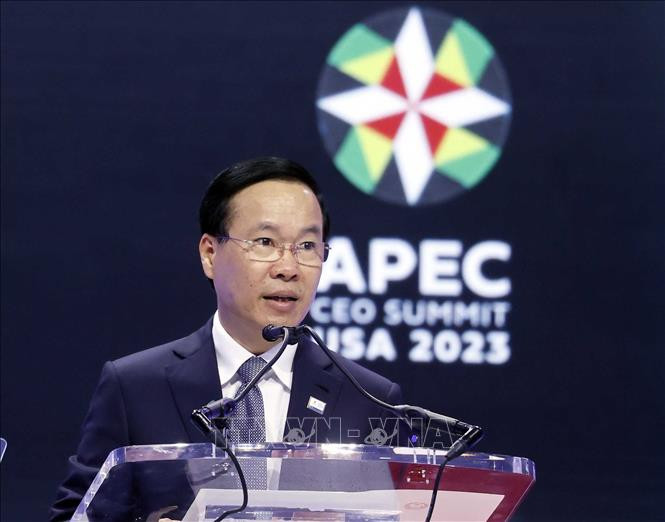
Dear Ladies and Gentlemen,
I would like to thank the Organizing Committee of the APEC CEO Summit 2023 for creating the opportunity for me to meet you – representatives of the dynamic, enthusiastic and creative business community of the Asia- Pacific region. This is an important occasion for us to share our vision and seek effective solutions to major, urgent and strategic issues for the future of the region and the world. I believe that this conference will make a practical contribution to cooperation and development in the Asia-Pacific region, as well as the success of the regional business community.
I would like to discuss three issues. First, the issues facing the world economy and the need for new thinking and new approaches. Second, how APEC, including businesses in the region, can contribute to solving the current challenges of the world economy. Third, Vietnam's perspective and development orientation in a changing world.
Ladies and Gentlemen,
I. On the issues facing the world economy and the need for new thinking and new approaches
1. The history of human development is a process of continuous discovery, innovation, adaptation, and tireless striving for peace, progress, and prosperity. At each key moment, the world needs strong, bold decisions to overcome difficulties and open up new directions. After nearly three decades of continuous growth of the global economy, we are facing a series of crises and the risk of a “lost decade” as the World Bank has warned.
I think that the world economy today has major contradictions, which are: (i) The economy is growing, wealth is increasing, but the gap between rich and poor is widening and environmental destruction is becoming more and more serious; (ii) After more than three decades of the world benefiting from globalization and forming a network of international economic relations with intertwined interests and interdependence, the trend of protectionism and separation is increasing strongly; (iii) Science and technology are developing rapidly, with global influence, but the institutional framework is still basically limited to the national level; science and technology bring great development opportunities but also contain unpredictable dangers; (iv) We pursue a growth model that encourages consumption, even overconsumption, but cannot mobilize enough resources for the Sustainable Development Goals.
2. What is the solution to fundamentally resolve those conflicts?
Albert Einstein said: “The world as we have it is the result of a process of thinking. Humans cannot change the world without changing their thinking.” To continue pursuing the lofty goals we have set, we need a new way of thinking that is inclusive, harmonious and humane.
Firstly, it is necessary to ensure the mutual relationship between economic growth, social equity and environmental protection. The measure of an economy's success is not only the scale and growth rate of GDP, but also the welfare of its people and the impact on the environment in both the short and long term. Economic growth based on consumption and resource exploitation needs to be replaced by a more sustainable, circular economic model. At the national level, economic development policies should not only facilitate business investment, but also improve the quality of employment, increase income for workers, and contribute to preserving the ecological environment. At the regional and global levels, cooperation between countries should not only aim at reducing emissions and converting to clean energy, but also create conditions for developing countries to expand the scale of their economies and narrow the development gap. And finally, at each enterprise, the new business philosophy is to link business profits with the common interests of society.
Second, maintaining an open and connected world economy while ensuring economic security for countries. The COVID-19 pandemic and recent instability have highlighted the fragility of the economy and supply chains in the face of shocks. Ensuring economic stability and security is a legitimate need of every country. However, increasing protectionism and market separation will weaken the global economy and reverse the achievements of international economic integration. There needs to be close coordination between countries to enhance the ability to respond to crises, build a transparent and equitable global economic governance system, and ensure the balance of interests of all countries, large or small.
Third, global governance of technology (especially artificial intelligence and biotechnology) is not only aimed at managing the development of technologies, but also at addressing the economic, social, cultural and political consequences of this process. The formulation of common laws, regulations and standards must take into account the development level of each country, ensuring that all countries, large or small, and all people benefit from scientific and technological progress. At the same time, it is necessary to ensure a balance between creating a favorable environment for scientific and technological development and ensuring the safety, security and sovereignty of each country.
Fourth, it is necessary to prioritize resources for sustainable and inclusive development goals. The world has passed more than half of the 2030 Sustainable Development Goals, but the gap between commitment and implementation is too large. With the current approach, the Asia-Pacific region can only complete these goals by 2065, which is 35 years later than the original plan. Therefore, it is urgent to mobilize and effectively use public, private, domestic and international financial resources, as well as contributions from organizations and people. Developed countries also need to better implement their commitment to contribute 0.7% of their total national income to support developing countries.
Ladies and Gentlemen,
II. On APEC's contribution to addressing world economic challenges
1. Three decades ago, at Blake Island, the United States, senior leaders met for the first time and determined APEC's mission as a pioneering forum to promote free trade and investment, opening a new page in the history of cooperation and development in the Asia-Pacific. Since then, APEC has always been an "incubator" of economic integration ideas, laying the foundation for global cooperation agreements. APEC is also at the forefront of promoting green growth, responding to natural disasters, strongly supporting gender equality, supporting small and medium enterprises, improving the quality of health and education. In those successes, there has always been the companionship and important contributions of the business community in the region.
2. Today, as the global economy faces a new wave of protectionism, challenges from climate change, social inequality, and geopolitical conflicts, APEC is the place for us to seek and test new ideas and solutions. I believe that APEC will continue to play an important role on the new journey, especially in the following areas:
First, restore and strengthen confidence in free trade and investment. The history of international trade has had its ups and downs, but trade has contributed greatly to the development and prosperity of nations. Yet, since 2019, more than 3,000 trade barriers have been established, making the world economy less stable and threatening to reduce global economic output.
More than ever, APEC needs to reaffirm its commitment to maintaining open markets, promoting international economic integration, and supporting an open, inclusive and sustainable world economy. Ensuring that the benefits of trade are widely and equitably distributed in society. Free trade and investment will help Asia-Pacific economies improve their competitiveness and continue to be the top choice of investors.
Second, promote international cooperation on economic security, especially to enhance the resilience of member economies and businesses in the region against future crises. APEC is a forum for economies to enhance information sharing, coordinate policies, promptly resolve difficulties and ensure the smooth operation of regional supply chains. In addition, cooperation on food security, energy security and trade connectivity to diversify supply sources will also contribute to strengthening the economic security of members.
Third, support economies to prepare for new development trends through: (i) Applying and managing breakthrough technologies, especially artificial intelligence, quantum computing, biotechnology; testing the development of principles and orientations on technology management at the regional level; (ii) Researching, piloting and replicating green economic models, circular economy, clean energy conversion; (iii) Improving the capacity to build social policies so that all people, especially women, the poor, the disadvantaged, and small and medium enterprises, can actively participate and benefit from economic growth.
The business community has always been an important part of the APEC process, actively contributing to policy formulation and implementation as well as promoting new ideas and new thinking. In the face of the enormous challenges we are facing, I call on the business community to join the State in implementing its commitment to sustainable development, pursuing long-term economic, environmental and social goals; increasing investment in science and technology, investing in people, investing in building inclusive and resilient communities. This is an opportunity for businesses to make their mark in society, building trust and brand value.
Ladies and Gentlemen,
III. On Vietnam's development viewpoints and policies
1. Maintaining sustainable economic growth along with progress, social justice and ecological environment protection, ensuring that all people can develop their potential, participate and equally enjoy the fruits of development is a requirement throughout the development process of Vietnam. Economic growth along with progress and social justice must be carried out immediately in every step, every policy and throughout the development process; not "sacrificing" progress and social justice and the environment to pursue purely economic growth.
With that perspective, Vietnam is synchronously implementing 3 main groups of solutions:
Firstly, building an independent and self-reliant economy associated with active and proactive international integration; taking internal strength as the fundamental, strategic and decisive factor, external strength as the important and breakthrough factor. Accordingly, the focus is on promoting economic restructuring associated with innovation of the growth model towards green and clean, towards realizing the goal of carbon neutrality by 2050. At the same time, promoting the implementation of 3 strategic breakthroughs in institutions, infrastructure and human resources; promoting development based on science - technology, innovation and culture, Vietnamese people. With these efforts, Vietnam is considered one of 7 middle-income countries that have made much progress in innovation in the past decade; one of 3 countries with outstanding achievements compared to the level of development for 13 consecutive years.
Along with maintaining macroeconomic stability and ensuring major balances of the economy, we attach great importance to promoting international trade and investment cooperation. Vietnam has signed more than 90 trade agreements and 60 bilateral investment promotion and protection agreements; is a member of 16 Free Trade Agreements with the participation of about 60 economies. Vietnam has continuously been in the group of 30 countries and territories with the largest import and export value of goods and the top 10 destinations attracting foreign direct investment (FDI) in recent years [1] .
Second, strengthen the management and efficient use of resources; protect the environment and respond to climate change; promote green transformation towards global goals and commitments on climate. In parallel with perfecting mechanisms, policies and laws to promote the development of green economy, low-carbon economy, and circular economy, the State also studies to supplement many tools to support businesses in digital transformation, green transformation, especially the application of new technologies, access to green financial resources and human resource training. The establishment of the Just Energy Transition Partnership (JETP) between Vietnam and a group of international partners will also make an important contribution to realizing Vietnam's commitment at the 26th Conference of the Parties to the United Nations Framework Convention on Climate Change (COP26) to achieve net zero emissions by 2050.
Third, create an environment that encourages the poor and disadvantaged to strive, rise up by their own strength, integrate into the community, and eliminate discrimination in society. People are the target and subject of development, all policies and future planning must aim at the happiness of the people. Vietnam is implementing 3 national target programs on sustainable poverty reduction; building new rural areas and socio-economic development in ethnic minority areas, focusing on improving the quality of human resources through developing an equal, inclusive and comprehensive education - training and vocational education system; at the same time, creating conditions for the young workforce to access science and technology.
Ladies and Gentlemen,
To achieve the set development goals, in addition to our own efforts, we hope that you will continue to accompany Vietnam in consulting, proposing new investment policies and ideas; transferring modern solutions, technologies, new economic models; and attracting investment capital and supporting development. With the policy of taking quality, efficiency, high technology and environmental protection as the top criteria, Vietnam prioritizes attracting investment projects in industries and fields such as: (i) Science - technology, innovation; (ii) Green economy, digital economy, circular economy, knowledge economy; (iii) Electronic components, electric cars...; (iv) Semiconductor production, new energy (such as hydrogen), renewable energy; (v) Developing financial centers, green finance; and (vi) Biotechnology, healthcare...
Vietnam always cares for and accompanies the business community both domestically and internationally; respects and protects the legitimate and legal rights and interests of investors; and ensures the harmony of interests between the State, investors and workers. We consider the success of enterprises as our own success, and the failure of enterprises as the failure of the State in policy management. We welcome and create the best conditions for you to invest in the above-mentioned fields.
Ladies and Gentlemen,
2. APEC's success can only be achieved on the basis of friendship and trust among members, and the companionship of businesses and people. I hope that all APEC members will uphold the spirit of cooperation and responsibility, uphold multilateralism, put aside differences to resolve difficulties and overcome challenges for peace, cooperation and development in the region and the world. Vietnam is ready to join APEC members and the Asia-Pacific business community in building a bright future for all people. I believe that with the consensus and determination of all of us, APEC will continue to write success stories in the new development period.
Poet Ina Coolbrith, the first poet laureate of California poetry in the early 20th century, wrote warm, bright verses about the city of San Francisco:
From here, the Golden Gate of the city,
Welcoming the brilliant eastern sunshine,
The sunset casts a sparkling glow,
Reigning in eternal glory,
City of fog, and of dreams!
And today, in San Francisco where we are meeting, let us continue to light up the dreams of our city, of a dynamic, creative, prosperous Asia-Pacific region, and of a peaceful and cooperative world.
Wishing you health and happiness!
Wish the conference great success!
Thank you very much.
__________________________
[1] According to the assessment of WTO, UNCTAD and international banks.
Source


![[Photo] Unique Phu Gia horse hat weaving craft](https://vphoto.vietnam.vn/thumb/1200x675/vietnam/resource/IMAGE/2025/10/10/1760084018320_ndo_br_01-jpg.webp)
![[Photo] Opening of the World Cultural Festival in Hanoi](https://vphoto.vietnam.vn/thumb/1200x675/vietnam/resource/IMAGE/2025/10/10/1760113426728_ndo_br_lehoi-khaimac-jpg.webp)
![[Photo] Ho Chi Minh City is brilliant with flags and flowers on the eve of the 1st Party Congress, term 2025-2030](https://vphoto.vietnam.vn/thumb/1200x675/vietnam/resource/IMAGE/2025/10/10/1760102923219_ndo_br_thiet-ke-chua-co-ten-43-png.webp)



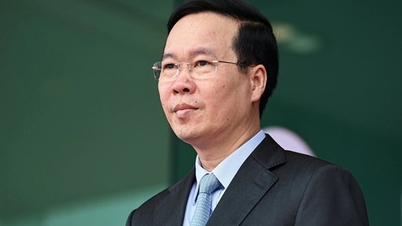

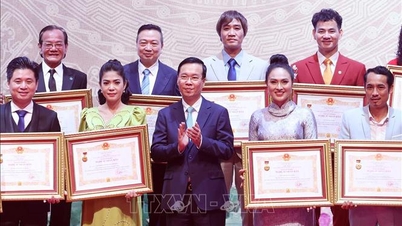

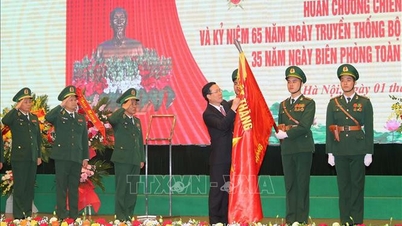
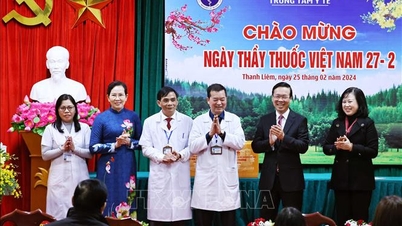
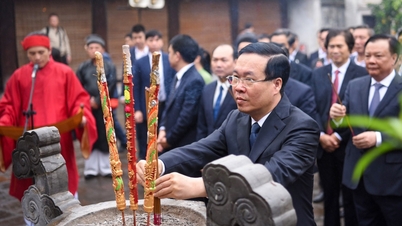
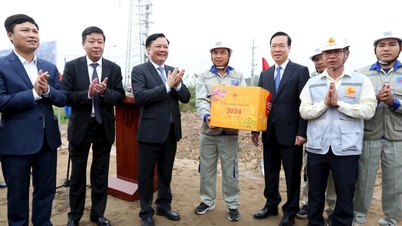

































































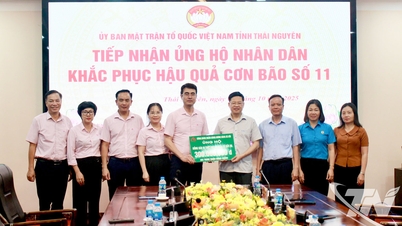






















Comment (0)